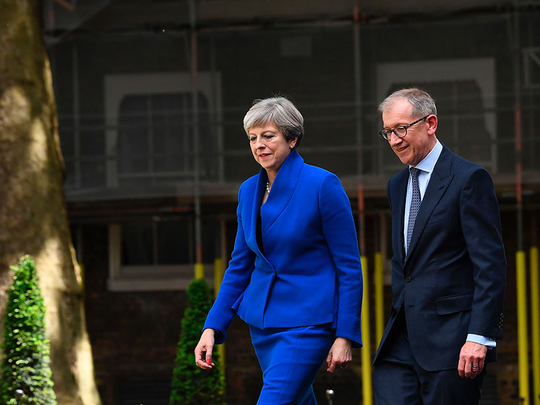
Washington: British Prime Minister Theresa May emerged from national elections damaged and without the mandate she sought. Her efforts to align with Trump may have hurt her, and she now has less leeway to cooperate with a leader a majority of Britons recently labelled a threat to international security.
She also has less leverage. May’s Conservatives lost their majority in Parliament in the election Thursday, and she must now govern in a coalition — if she keeps her job at all.
Britain’s relationship with the United States was far less important as an election issue than domestic economic and security concerns, but some voters appear to have punished May for cosying up to Trump and elements of his populist agenda.
May is left weaker both in her dealings with Europe and the United States, US and British analysts said.
“With a minority government or a bare majority government it will be tougher to stand up to Trump. The smaller the majority, the tougher that is,” said Thomas Wright, director of the Brookings Centre on the United States and Europe.
“And it will not be her main priority,” he added. “She will be fighting for her own job.”
The Conservatives now control 318 seats, more than any other party but just under 49 per cent of total seats. May remains prime minister, but there are already calls for a Tory leadership shake-up.
For Trump, May’s political tumble represented only the latest blow to his anti-globalist message after his surprise victory last year — along with the ‘Brexit’ vote in Britain to leave the European Union — appeared to augur a populist wave on both sides of the Atlantic.
Instead, France decisively elected a pro-European Union president last month in Emmanuel Macron, rejecting the nationalist candidacy of Marine Le Pen, whom Trump had supported. And in Germany, longtime Chancellor Angela Merkel, who has been hailed as a bulwark against Trump in support of the traditional liberal order, has in recent months seen her standing rise ahead of her bid for a fourth term later this year.
Far from heading up a new transatlantic coalition of nationalist-leaning leaders, Trump finds himself increasingly isolated, as he was on his recent trip to Europe during which Merkel, Macron and others unsuccessfully pressed him to keep the United States in the landmark Paris climate agreement. Trump’s caustic calls on fellow Nato leaders to devote more money to defence spending, on the grounds that the United States has carried an unfair burden, sounded less like a rallying cry to some of his colleagues than a petulant display of hubris.
Trump did not immediately comment Friday on the UK election except to call the outcome “surprising” when asked during a photo opportunity in the Oval Office. A spokesman for the National Security Council did not respond to a request for comment.
Dan Fried, a former State Department assistant secretary for Europe who is now at the Atlantic Council, said there are parallels between this week’s British election and the 2016 US presidential contest. Then, favoured candidate Hillary Clinton first faced a strong challenge from self-described socialist Senator Bernie Sanders before losing to outsider Republican candidate Trump amid voter anger at the status quo.
“It also means that the UK, like the United States, might be consumed by domestic politics,” in the aftermath of this vote, Fried said. “That is a loss that doesn’t help America at all. Between domestic politics and Brexit, the UK has less energy to devote to global issues where we need it.”
Although she publicly disagreed with Trump on some issues during the US election last year, May had rushed to put her relationship with the US leader on good footing with a visit to the White House just days after Trump’s inauguration.
It was a calculation that, despite differences of opinion, Britain must continue to stress rock-solid alliance with the larger, richer and more powerful United States. It now sets her apart from the other two large European players — France and Germany — whose leaders have moved to distance themselves from Trump, at least rhetorically.
May’s principal opponent, left-wing Labour candidate Jeremy Corbyn, was hostile to Trump during the election campaign and cast May as the unpredictable American leader’s toady.
“Waiting to see which way the wind blows in Washington isn’t strong leadership,” Corbyn said last month. “And pandering to an erratic Trump administration will not deliver stability.”
May was ridiculed for holding hands with Trump during an awkward White House stroll, a meme that resurfaced during the campaign as proof that she had been naive.












